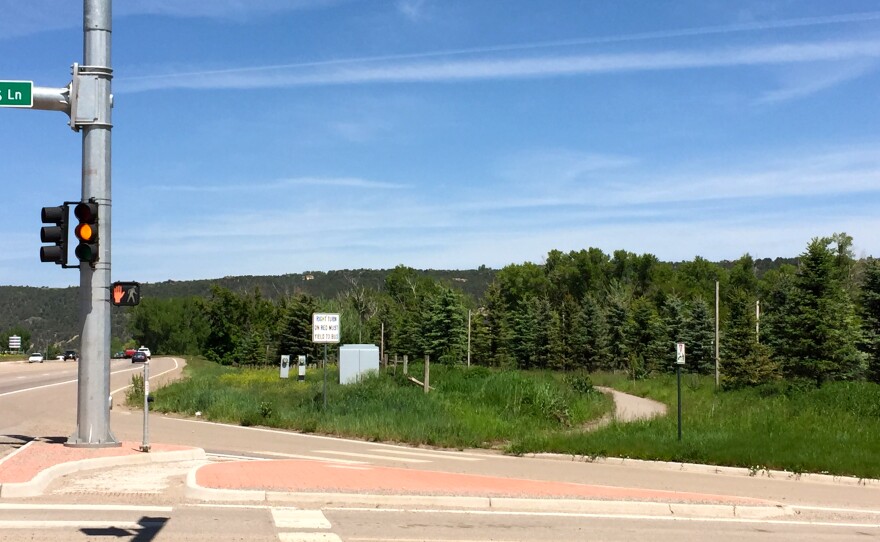The Roaring Fork Valley Regional Planning Commission will review a proposed housing development in El Jebel today. It’s a project that could bring needed affordable homes to an area seeing barely any inventory and skyrocketing prices. Aspen Public Radio's Elise Thatcher continues our series on the housing shortage today with an exploration of new proposed developments, and some already in the works.
Jon Fredericks is working in a cozy Carbondale office, with his dog hanging out near his desk. Fredericks is a planner with the firm LANDWEST, and he's working on the large development proposal called The Tree Farm. "We are proposing a 71 acre development project in the midvalley,” he explains. “There is to be about a maximum of 400 residential units."
It would be across Highway 82 from Whole Foods in Willits. "The units that we are proposing are to be kind of smaller in scale than what we would typically see in the midvalley,” Fredericks continues. “So we're looking at townhomes that average anywhere from 1300 to 3000 square feet on the largest end."
There would be condos, too. But most of the units would be apartments, with a mix of free market and affordable housing rentals. "There is a serious need in the midvalley [of units],” says Fredericks, “whether deed restricted or they are actually affordable just in virtue of being fairly priced rentals. There's a serious lack of housing in the price ranges that we're looking at."
Which, to be fair, would likely start on the higher end for free market rentals, with studios going for $1500, one bedroom apartments at $1600, 2 bedroom apartments around $1900 - $1900 and three bedrooms for around $2100. That's based on today's prices, so they could change. The land is owned by a family living nearby, and Fredericks is adamant the development would be built piece by piece, based on market development. If approved by Eagle County Commissioners this year, one or two apartment buildings would likely go up first. If all goes as planned, commercial space and public trails would be built...and open space would be included.
Tamra Allen is the Planning Manager for Garfield County, further down the Roaring Fork Valley. She’s seeing a different flavor of proposals. "A lot of what we're seeing in Garfield County are people developing existing lots,” says Allen in her Glenwood Springs office. “There are lots of subdivisions in the County that have lots of capacity left. And so we are seeing, currently, a lot of those lots being developed." Allen says the County has “double the number of new residential starts that we had last year. In a matter of one year. And we're only half way through this year."
A lot of that infill approach is being carried out in the Ironbridge and Aspen Glen subdivisions, between Glenwood Springs and Carbondale. There's also some in Battlement Mesa and Silt. Allen says most are by homeowners or property owners who plan to live on the lot. A smaller percentage are in anticipation of someone else moving in-- some of those are in Pinon Mesa, near Colorado Mountain College's Spring Valley campus.
One proposed sizable development is called River Edge. "It is a subdivision between Carbondale and Glenwood,” explains Allen, “and they have an estimated 360 plus units that they would actually go through and plat a subdivision for and come back later and develop. We'll see where it goes, but it actually in the review process now." The review has gone on for several years with questions about whether it's a good fit for the area.
Officials in Glenwood Springs and Carbondale say most new residential development there is also is infill. And there are two rental complexes under review in Glenwood. The town may get a small new subdivision. The city paused rules that require developers to include affordable housing for the last few years, to help spur new development.
Stacey Craft is a rental matchmaker with Happy Real Estate in Basalt. "We need to be building not just affordable housing but we need to be pushing through housing approvals to get some projects built," says Craft by phone. Carbondale Realtor Lynn Kirchner agrees new homes are needed, but points out a major factor in the Roaring Fork Valley. "So many of the communities are against growth of any sort,” she laments.
Many residents and local governments take pride in preserving open space and often avoid new construction, pointing out it’s a key part of what makes the area attractive and enjoyable to live in. But Kirchner finds a contradiction there. "Each community has to decide what it wants to be when it grows up. You can't have it both ways,” she says. “You can't want to attract all these people to the Valley, and expect them to just come and go. They've come here, they want to live here, they've gotten jobs here."
Which leads to another key factor brought up by nearly everyone interviewed for this story. "If you look at the state demographer’s projections for the tri-county area, which is Pitkin County, Eagle, and Garfield county, they are projecting over the next 15 years, a 30% increase in population,” says Fredericks at his Carbondale office. “Which is, it's somewhat hard to fathom.” Fredericks isn’t sure what percentage of the Tree Farm project would house existing Valley residents or newcomers. The Roaring Fork Valley Regional Planning Commission will consider the proposed development and take public comments tonight.
Editor’s note: You can read or listen to our previous stories in this series, by clicking the links below this post.









